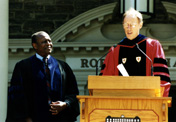A Commencement For the Millenium

Charles Willie and Tom Tritton
Details
Following the traditional procession of graduates and faculty across Founders Green, President Tom Tritton addressed the graduates and urged them to "live adventurously" and let their lives speak. "Don't budget your enthusiasms," he said. "Don't hold back your passions, and please don't restrain your curiosity."
The Class of 2000 also was greeted by four distinguished honorary degree recipients who offered their own unique words of wisdom to the graduates.
Sociologist and human rights activist Charles Willie presented "a few life-saving and career-building lessons." Willie, the Charles William Eliot Professor of Education at Harvard's graduate program in education, told the graduates to focus on possibilities instead of practicalities and never let failure diminish one's expectations. Before receiving an honorary doctor of humane letters, he also asked the Class of 2000 to accept a "calling to be humble" and "learn to be a person for others."
Willie, a classmate of Martin Luther King, Jr. at Morehouse College in Atlanta, was a founding member of the Human Rights Council in Massachusetts and former chair of the Greeley Foundation for Peace and Justice.
Madeleine L'Engle, a prolific writer of fiction, non-fiction and poetry, was awarded an honorary doctor of letters from the college. She implored the graduates to make the next thousand years "at least a little bit better than the last millennium."
"We work with what happens," she said. "We can't change what happens, but what we do with it makes all the difference." Best known for her Newbery Award-winning children's book, A Wrinkle in Time, L'Engle has written an entire series of science fiction fantasies for youngsters. Two of those books, Meet The Austins and A Ring of Endless Light, earned American Library Association Book of the Year honors.
Taking L'Engle's message a step further, Edward Said, a former member of the Palestine National Council and longtime critic of U.S. policy toward Israel and the Palestinians, urged the graduates to make the world a better place by questioning and challenging "the framework of knowledge." He warned against blindly accepting the viewpoints of so-called experts and expressed a need to "ask the embarrassing questions that will make you controversial."
Said, who has been a professor of English and Comparative Literature at Columbia University for the past 40 years, is the only American citizen to ever receive the Sultan Owais Prize, the premier literary prize in the Arab world.
All 16 of his books, including Orientalism--which examines the way in which the West perceives the Islamic realm, have been translated into 26 languages. Said was awarded an honorary doctor of humane letters.
Jocelyn Burnell, a Quaker and a professor of physics at The Open University, the United Kingdom's largest university, asked the Class of 2000 to "give with a generous spirit" but make sure to take time to enjoy life.
Prior to her appointment at The Open University, Burnell conducted research and taught gamma ray astronomy at the University of Southampton and x-ray astronomy at the University College London. As a doctoral student at Cambridge University, she was involved in the discovery of pulsars, which opened a new branch of astrophysics and earned her supervisor a Nobel Prize.
Besides her accomplishments in the world of physics, Burnell has remained active in the Religious Society of Friends. She was Clerk for Britain Yearly Meeting from 1995 until 1998 and has written for some 35 Quaker publications. She received an honorary doctor of science at the commencement ceremony.



